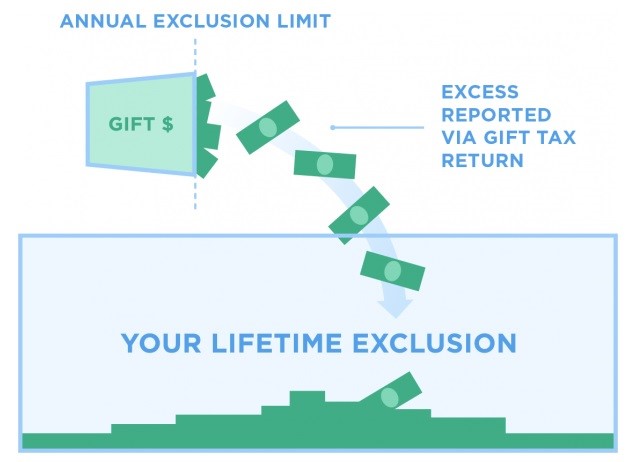
TrustWell Resource Guide
July 19, 2023
Quarterly Market Review: October 2023
October 2, 2023By Christopher Daunhauer
I’ve had several clients in the past year mention in passing that they would enjoy giving significant amounts to their children or grandchildren but cannot do so because of “the gift tax rules.” One of my long-time clients told me she was positively perturbed that the IRS “prevents” her from giving her own money to her heirs until after she’s dead.
———————————————————————-
We’re still a little ways off from the coming election season (and I’m honestly not looking forward to it), but a “fact check” is in order here.
It’s true that there is a gift and estate tax law on the books, it’s true that the tax rate is relatively high, and it’s true that there are “gift tax rules” that must be followed. But it’s also true that the rules are widely misunderstood, and those misunderstandings are needlessly preventing people from doing what they want to do. The rules are not as onerous as most believe.
I think giving large amounts of money to one’s children is often a bad idea (this is especially true for bailouts of irresponsible children), but taxes and penalties are rarely the reason.
You can absolutely give large amounts of your money and property and equity away, to whomever you choose, as often as you choose (even before your death) and in most cases you can do so without triggering any gift or inheritance taxes (now or in the future).
Understanding the rules is key. Here are some things to know:
First, gifts of cash or property that you make to individuals are not deductible on your tax return. You can only deduct donations to qualified non-profits (those are the 501(c)(3) organizations registered with the IRS). Most people know this already, but I say it here just in case.
Second, during 2023 you can give away up to $17,000 in cash or property or equity to each of as many different individuals as you wish without having to keep any records or paying any tax or penalty or filing any additional IRS forms. (Married couples can give away up to $34,000 in 2023 to as many different individuals as they want.) This amount called the “annual gift tax exclusion” amount. Note that these limits are not the sum of all of your giving during a single year, they are sum of all your gifts per recipient during a single year. Let’s say you have four friends and you want to give each of them the max of $17,000 (total giving of $68,000 in a single year) that’s fine, because you made no gifts in excess of $17,000 to any single person in a single year. Each gift is under the annual exclusion. (Basically, if you stay under the annual limit per person, you’re home free.)
Most people know the first rule, and many people know the second fact. But tons of people wrongly assume that any gift in excess of the annual exclusion amounts is either flatly prohibited OR automatically triggers taxes or penalties.
Not so.
That’s because there are actually TWO exclusions. The first one is the ANNUAL gift tax exclusion – that’s the maximum amount you can gift to a person each year without having to tell the IRS about the gift. The second exclusion is the LIFETIME gift tax exclusion. The first one is currently $17,000 per person per year. The second one is currently $12.92 MILLION per taxpayer. This second exclusion is a “buffer” account of sorts that the IRS maintains over the course of a taxpayer’s lifetime. And as long as you have some lifetime buffer remaining, you pay no estate or gift taxes.
Making a gift of more than that year’s annual gift tax exclusion does not automatically trigger taxes. It just means you have to notify the IRS of the amount in excess of the annual exclusion via a gift tax return. The portion of your gift that was in excess of the annual exclusion reduces your remaining lifetime gift tax exclusion by that same amount.
In other words, making gifts of more than the annual exclusion reduces your lifetime buffer by the amount of the overage, but does not trigger taxes or penalties as long as you still have some buffer remaining.
Here’s a graphic that helps illustrate the concept… from a great article on nerdwallet.com

If you always keep your gifts under the annual exclusion limit, then you will always have the full lifetime exclusion / buffer available to you in future years. If you die without ever having made gifts in excess of the annual exclusion limit, your estate could distribute up to $12.92 million (in 2023) without your estate having to pay any federal estate or gift taxes.
BUT (and this is the point of this blog post) if you do NOT keep your giving under the annual exclusion limit per person per year, it’s not the end of the world. In that case, any amounts in excess of that year’s annual exclusion just use up a little bit of your lifetime exclusion. That’s OK for the vast majority of Americans, because it is only AFTER you have used up all of your lifetime exclusion that you (or your estate) have to pay gift or inheritance taxes.
Here’s a reasonable plan for most people – if you think it’s likely that your estate will one day be large enough to need all of your lifetime exclusion, then try to keep all gifts during your life under whatever the annual gift tax exclusion is for those same years. If you’re married, keep your joint gifts to any person under 2X the annual number.
But, if there is not much chance that you or your estate will ever be large enough to need all of your lifetime exemption, OR you don’t care if your estate has to pay some taxes after you are dead, then don’t let the annual limit cramp your style too much while you’re living. If you want to give more than the annual limit to a person for a special occasion or a special purpose, go ahead. Just make sure you or your tax preparer files the required IRS Form 709 gift tax return for that year, so the IRS knows that you chose to use up a portion of your lifetime gift tax exclusion during that particular tax year. Remember, filing the required IRS Form 709 does not trigger a tax unless you have already used up all of your lifetime exclusion. Exceeding the annual exclusion and not filing Form 709 will get you in trouble with the IRS.
Several years ago, my mom chose to gift some cash to me and my two brothers that she had received from her mother’s (my grandmother’s) estate. My mom’s thinking was that she would still have plenty of assured lifetime income even after making the proposed gifts and she wanted me and my brothers to have use of some of her money sooner rather than later. She knew that all three of those gifts would be in excess of the annual gift tax exclusion limit but she also knew it was very unlikely that she would be making any large gifts after those and also unlikely she would have an estate anywhere close to the $12.92 million lifetime gift tax exclusion. I explained the IRS rules to her and she decided to proceed with her plan. She made the three gifts and I helped her include a completed IRS Form 704 when she submitted her tax return for that year.
Even though she blew through the annual limit in making those gifts, she paid no extra tax or penalties, and she got no mail from the IRS about exceeding the annual limit. She did her research, she followed the IRS rules, and she did what she wanted to do. She’s a pretty smart lady, if I do say so myself.
All that said, here are some caveats and cautions….
The IRS definition of “gift” is fairly broad; it includes more than just cash and checks. Paying off another person’s debt is a gift to that person, and forgiving a debt is a gift to the borrower. Giving someone a car or a piece of real estate is a gift. When your elderly parent adds your name to his or her checking account as a co-owner (usually a bad idea, BTW) so you can pay his or her bills, that parent has made a gift to you of the full amount in the account at the time. Selling a friend something for less than it’s really worth is a gift, per the IRS, and the difference between what he or she paid and the fair market value is the amount of the gift.
Some transfers of cash or property or equity are NOT “gifts” in the eyes of the IRS if you do them correctly:
- Giving money or property to your spouse and/or dependents is generally not considered a gift by the IRS. There is no limit on those. But giving money or property to a son or daughter who is not still your dependent IS a gift per the IRS.
- Paying someone else’s medical expenses is not a gift if you pay the provider directly.
- Paying someone else’s education expenses is not a gift if you pay the school directly. Also note that large deposits to someone else’s 529 post-high-school-education investment account can be spread over several years of tax returns in many cases.
- Contributions to political campaigns and political parties are not gifts subject to tax (and why am I not surprised?)
The annual gift tax exclusion of $17,000 ($34,000 for married couples) is the limit for 2023. This annual exclusion amount has been raised periodically since 1977, when limits were first established by law. It will probably but not certainly keep going up over the years ahead.
The LIFETIME gift tax exclusion may not be as high for your estate as the $12.92 million that it is for 2023. The lifetime exclusion can be changed (even to zero) by Congress in future years if it decides the government needs more tax money. Under current law, the lifetime exemption will revert back to $5 million in 2026 unless Congress acts to make it a different number between now and then.
Several states (Florida is not one of them) levy gift, inheritance, and/or estate taxes that are in addition to any federal / IRS taxes. So, check the rules, tax rates, and exemption amounts for your state.
Finally, keep in mind that every person and every gifting situation is different. So, get some guidance on your particular goals and tax situation before making any significant or complicated gifts. Call us or your tax preparer if we can help.




